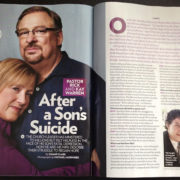Using Pain in Preaching
Using Pain in Preaching
One last reflection on how to preach while in pain. We’ve been looking at this subject for the last few posts, and today we are going to consider using pain in preaching your sermons.
Henri Nouwen has said, in his book, The Wounded Healer, that God can use our pain. Here’s the quote:

Henri Nouwen quote from The Wounded Healer
An Example of Using Your Pain

Rick and Kay Warren
In other words, our pain can become a source of hope for another person. I’ve referenced Rick Warren’s return to preaching in this series on preaching and pain. After 16 weeks off after his son committed suicide, he returned to preaching at the Saddleback Community Church, and preached about how he and his wife had chosen to trust God, even in the midst of the question, “Why”.
In his message, he made these points, as told by a reporter for the Christian Post:
“During Warren’s message, he and Kay shared three main areas of biblical truth that gave stability during their grief. First, life doesn’t make sense, but people can have peace because “God is with us and loves us.” Secondly, everything on earth is broken, but “we can have joy because we know God has a greater plan.” And third, “we know that life is a battle, but we can have hope because we know there is more to the story.””
This is an example of using your pain in preaching a message of hope for your listeners. The Warren’s pain became a series of messages and lessons in the church, as well as support groups and counseling for those who are considering suicide.
The Power of Using Your Pain in Preaching
When you are going through pain, and admit it to your people, your message will have power! People are ready and willing to listen to your experience, to learn from watching how you handle your pain, and to give you the support that you need in the midst of your pain. But here is a warning: this must be done appropriately!
Make It About God, Not About You
I recently did a funeral for a man who had committed suicide. His family was devastated, as you probably can imagine. Afterward, a woman came to me and told me about a relative of hers whose son had also committed suicide. The father of the young man was a pastor, and he decided to preach the message at the funeral himself. This was an incredibly brave thing to do, on the one hand, and a very foolish thing to do on the other hand. You see, he hadn’t processed his pain yet. As a result, he expressed his anger at God, and at one point lifted up the urn (the son had been cremated), and threatened to throw it down and smash it. Needless to say, the audience went home traumatized.
Make Sure It’s “Real” Pain
I was in a seminar once with a small group of people, listening to John Maxwell talk about leadership. The subject turned to preaching. The week prior, John told us, he had been in a church service where the pastor got up to begin his sermon. Instead of turning attention to the Bible, he began talking about the fact that his back was bothering him. Maxwell said that he carefully delineated the challenges of the week, and the negative effect on his sermon preparation.
He then turned to us and said, “Don’t do that! People don’t care about your back! Quit talking about yourself, and begin talking about God.”
It’s a good point. There’s a world of difference between loss of a son and a sore back. If you are going to share your pain, make sure that it is something major, not minor.
Use Your Pain in Your Preaching
Share your pain with your people appropriately. Take them along on your spiritual journey. The result will be spiritual growth for you (as well as support), and spiritual growth among your people.




Leave a Reply
Want to join the discussion?Feel free to contribute!